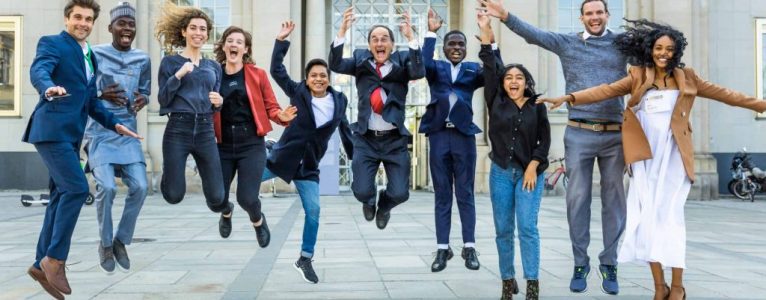The end of March 2022 HackHumanity virtually attended the Global Solutions Summit and this review is to give you an idea on my experiences and any formed insights. We had the opportunity by participating virtually in the Global Solutions Summit to engage with renowned scientists and representatives of international organizations, governments, and companies on the most pressing issues of our time – including Amina J. Mohammed (Deputy Secretary-General of the United Nations), Michael Kremer (Nobel Laureate), Robert Habeck (Vice Chancellor of Germany and Minister of Economic Affairs and Climate Protection), Mathias Cormann (Secretary-General OECD), and Stientje van Veldhoven (Vice President World Resources Institute).
So why did we attend in the first place?…Well…basically to see where ‘Status Quo’ currently is, in what realm of awareness, but also not to be captured in a ‘new paradigm bubble’ that’s so within my comfort zone… I wanted to feel how we perhaps are able to support each other and bridge the gap between these different states of realm… Because we just can not do it on our own right? We need everyone to chip in to learn to be flexible with our attachments, top-down, buttom-up, and everything in between. And for the sake of personal growth I was also curious to what extent I would be able to participate in discussions, give feedback, and reflect on matters. I also intuitively wanted to gain more insights on the G7 / G20 energies at hand).
The summit was based on several sustainable development themes and task forces, however there was one main theme: “How do we re-couple the economy with society for all wellbeing?”. It was clear by the organizing energies (Global Solutions Initiative / G7 / G20 / Think7-Tank) that there is now a evident disconnect between the economy and society (and nature) and we need to rethink and reorganize our society and economy to sustainable ones…And we need to do this fast.
Jeffrey Sachs (Economics professor, UN advisor, and global leader in sustainable development) gave a clear statement and message at one of the opening sessions on the first day: “Let the youth please step in quickly, the current (and older) generation just do not get it.”
A pretty bold however very clear message I cheered on). And I was a bit pleasantly surprised: There appeared to be a clear sense of realisme towards the need for a profound transition and to do this fast, with the current Corona pandemic and the threat of a third World War as strong drivers.
Here are e.g. some quotes picked up from the meetings I attended during the two days:
-
- We need social indicators as criteria so people come first, and not the economy
- We need not only to fix our systems, but also to transform them
- We need to focus on solutions instead of fixing problems
- We need new economic data to make adequate real-time decisions
- We need to build alliances, include Academia, Business, Society
- How can we protect our citizens best during the transition?
- Tax reform, Universal Basic Services
- There is a disconnect between Macro and Micro-level: we need to connect the ‘Miso-level’ in between
- Reshape the markets to sustainable ones
- Make it possible to reward companies that want to do good
- We need a new social contract, fit for the 21st century
- Organize collective infra-structures
- We need a universal set of (basic) needs
- Taking care of basic needs building trust, most people distrust governments
- Decision makers are afraid of the media, so use media to push them towards change
- How can we bring ‘top-down’ and ‘bottom-up’ together?
- We have only one planet and are using two: Let’s use money and let it flow urgently where it’s most needed
- How do we get the US onboard of Agenda 2030?
- We need a global resilience policy
- ………
And these are only a few short notes I made during the discussions…as you can see, there are a lot of things we need to do..
In the Final Plenary Session at the end of the second (and last) day there were some strong statements that give more hope towards the accelerating transition:
> Traditionally G20 and G7 policy making has focussed exclusively on the pursuit of economic prosperity, assuming that social prosperity would develop alongside it. The past decades have shown that this is not the case: market economies routinely give rise to environmental degradation and social crises (driven by rising inequalities, falling social solidarity and fear of disempowerment), leading to political crises (characterized by rising political fragmentation and conflict). Even where our economies serve our economic needs, they do not appear to have sufficient regard for our social and environmental needs
“Our future depends critically on our ability to transform our economic systems in accordance with our individual and collective goals: the pursuit of well-being of individuals in thriving societies within planetary boundaries. The requisite economic transformation must promote not just economic ends, but also social and environmental prosperity.”
Local, regional and national actions will have to be made coherent with global goals. The G7 and the G20 have a crucial role to play in this transformation, with both forums serving different purposes to achieve the collective SDG goals. Research institutions and civil society representatives, working alongside policy makers and business leaders, have a crucial role to provide knowledge and engagement that helps to support the transformation. Achieving coherence and consistency of policies – across G7 and G20, as well as across global, national and local levels of governance –will require an ongoing and reliable exchange among the relevant stakeholders to promote convergence or synergies among approaches to transformation.> end of quote.
So….All and all I feel more optimistic about the ‘current (old) paradigm’ clearly seeming waking up to the call to build the bridge to the ‘new paradigm’. I sense that our role in the process, with many others, lies now in the crucial ‘middle part’ to close the gap with practical, however bold, stepping stones that make sense. We all need to do this together so no one is left behind. We are up for it and waiting for the invitation to step in: Let’s hope it doesn’t take too long :-).
Oh, and Yes, we did share our Transition Tactics > https://bit.ly/Transition-Tactics
Many appreciation goes out to the organizers, the event was done very well, at least on the virtual side as I experienced it. More info: https://www.global-solutions-initiative.org/summit-2022/


